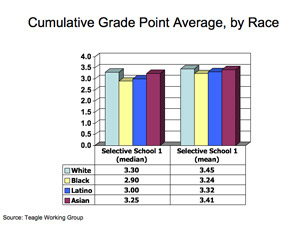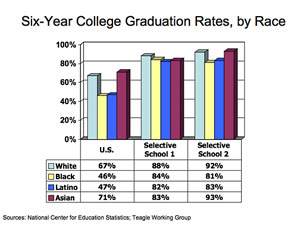Novel diversity programs offer promise, new study finds
By Franklin Crawford


When it comes to diversity initiatives, finding out what does work and doesn't work requires an initiative of its own. Even with the best of intentions, diversity programs can miss the mark and others actually have negative effects on minority students.
"College faculty and administrators devote a lot of time and energy to closing racial and ethnic gaps in higher education," said David Harris, Cornell vice provost for social sciences and the co-author of a new study that examines programs designed to eliminate racial and ethnic disparities in college completion and achievement. "But their efforts are compromised by a lack of complete and systematic information about the range and effectiveness of alternative programs."
Harris was part of a Cornell team that worked on the study with representatives from Colgate University, Hamilton College, Hobart and William Smith Colleges and Wells College. The 20-member consortium recently submitted its report, "Eliminating Racial and Ethnic Disparities in College Completion and Achievement: What Works and Why," to the Teagle Foundation, which funded the 18-month study.
The report provides an inventory of diversity initiatives at various schools around the nation, a detailed discussion of the strengths and weaknesses of notable programs, and guidelines for assessing such efforts.
The working group identified more than a dozen promising programs. For Harris, two stand-out initiatives were: "Equity Scorecard," developed by the University of Southern California (USC), and "Breaking Bread," a novel approach for bringing diverse student groups together developed at Colgate.
The USC model advocates quantifying annual indicators of racial and ethnic disparities from data that schools have already collected.
"Schools already have plenty of relevant data; they don't need to invest in new studies and surveys," said Harris. The resulting analyses are critical for identifying problem areas and assessing the overall success of diversity programs.
Colgate's "Breaking Bread" program provides funds for a joint dinner between, say, the College Republicans and a sexual-identity group. Working together, students create the menu, shop, cook and clean up. In the process, they problem-solve, negotiate and compromise. Breaking Bread works, Harris said, because in the course of mundane activities like shopping, students gain valuable insights into the lives of people with whom they would not usually associate. For that reason Breaking Bread transcends an academic course or an orientation exercise on diversity.
"We believe it is critical that diversity initiatives be developed with attention to the needs of minority and majority students, faculty and staff, and that they be evaluated with rigor," concludes the report. "It is simply unacceptable that some current programs have no effects, and in some cases negative effects, on minority students. We must do more for those students and for those who have fought so hard over the years to guarantee access to campuses."
The Cornell Teagle group included Harris; Raymond Dalton, executive director for the Office of Minority Educational Affairs; Marin Clarkberg, senior research associate at Institutional Research and Planning; senior Jorge Lee; and Christian Roman and Pauline Yi, both 2006 graduates.
The Teagle Foundation was established in 1944 by Walter C. Teagle (Cornell Class of 1899), longtime president and later chairman of the board of Standard Oil Co. (New Jersey), now Exxon Mobil Corp. The foundation provides leadership for liberal education, awarding scholarships, grants and other support to colleges and universities.
For a copy of the report, visit the Teagle Foundation Web site at http://www.teaglefoundation.org/learning/pdf/2006_cornell_whitepaper.pdf.
Media Contact
Get Cornell news delivered right to your inbox.
Subscribe